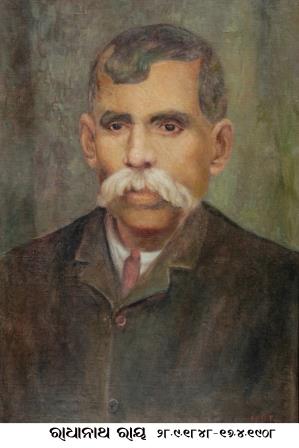Kabibara Radhanath Ray
Died :- 16-Apr-1908
Place of Birth :- Kedaarpur, Sora, Baleswar

Famous poet and hailed as the father of modern Odia poetry, Radhanath Ray was a writer of the initial modernity era in Odia poetry during the latter part of nineteenth century. He was born in a Zamindar family in Kedarpur village in Baleswar district, then under the Bengal Presidency and now in Odisha. He is honoured in Odia literature as Kabibara. In his early life, he composed in both Odia and Bengali but later shifted exclusively to writing in Odia.
Though the medieval Odia literature was rich and distinct in literary tradition and history, some Bengali educationalists wanted to abolish Odia language as the medium of teaching in schools. As Bengal was under by British rule much before Odisha, the Bengalis had the privilege to motivate the Anglicist scholars to prove Odia as a branch of Bengali language. However, John Beams, the then Collector of Balasore first tried to prove that Odia is more ancient than Bengali, and it had a richer literature which Bengali language lacked. In the Odisha division, there were only seven Odia School teachers; Bengalis formed the majority even in the remote areas. Consequently, Bengali text books were prescribed for Odia students. At that time, Radhanath was one of the prime figures along with Fakir Mohan Senapati and Madhusudan Rao who fought against such attempt at Bengali hegemony. Radhanath Ray was the Inspector of Odisha Schools Association and along with Fakir Mohan and Madhusudan, he tried to promote writing school text books. Under their pressure the conspiracy to impose Bengali on the Odia people was foiled.
Radhanatha Ray's first major work was Kabitabali, a collection of poems in Bengali written at the age of eighteen. The poems featured in most of the major newspapers and journals in Kolkatta during that time. His other collection of Bengali poems was Lekhabali. Later, he switched over to Odia language, and wrote famous epic poems like Kedara Gauri, Nandikeshwari, Chilika, Mahajatra – Jajatikeshari, Tulasistabaka, Urbashi, Darabara, Dasaratha Biyoga, Savitri Charita and Mahendra Giri. Besides, he wrote more than fifteen essays. Apart from his original works, he is also known for his translations and adaptations from the Latin Literature, which included Usha, Chandrabhaga and Parbati. Chilika, a long poem by Radhanath, is regarded as a semi-epic.
His writings were inspired by many English Littérateurs like Keats, Scott and Wordsworth. He has contributed to Odia poetry by introducing new forms. He has penned blank-verses, satires inspired by works of Dryden and Alexander Pope. He denounced despots, tyrants and oppressors, was concerned with social problems. He had a spirit of protest against conventional morality, a disbelief in the power of gods and goddesses, and patriotic sentiments, which finally brought him trouble from his employers. He was viewed as a national poet of the first order in Odisha.
Though Radhanatha contributed a lot to Odia literature, he was dragged into a controversy when Sudhala Dev, the then king of Bamanda, awarded the poet the title 'Kabibara'. The gesture made some poets and critics of modernism jealous and it was a serious topic of hot debate in two of the literary journals The Indradhanu and The Bijuli, each journal taking a side.
Books
Anthology of Lyrics
Travel Stories
Autobiography
Non-Fictional Writing
Eassays and Criticism
Copyright © 2024 Odia Virtual Academy. All rights reserved Total Visitors- 1
Powered by: Odia Virtual Academy

